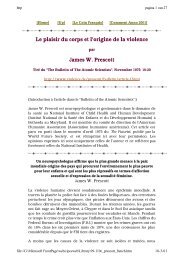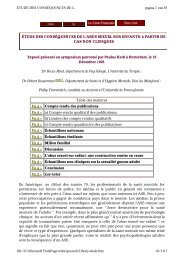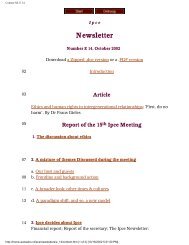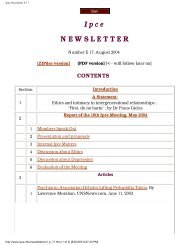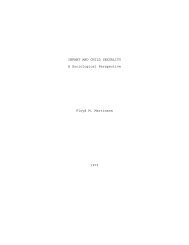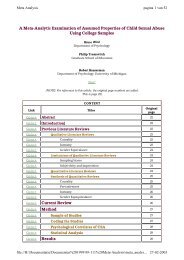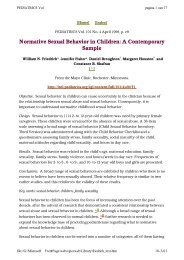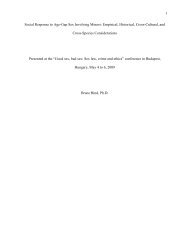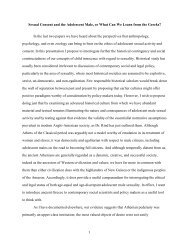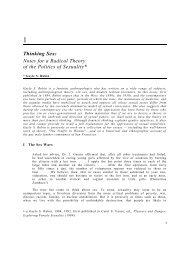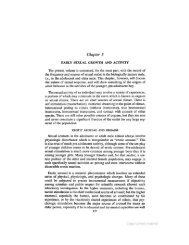Kapitel 2 - Ipce
Kapitel 2 - Ipce
Kapitel 2 - Ipce
Erfolgreiche ePaper selbst erstellen
Machen Sie aus Ihren PDF Publikationen ein blätterbares Flipbook mit unserer einzigartigen Google optimierten e-Paper Software.
anders Walsh: „In my view this is an area in which the legislature has a wide discretion or margin of appreciation<br />
which should not be encroached upon save where it is clear beyond doubt that the legislation is such that no<br />
reasonable community could enact" (Walsh in Dudgeon 1981 dissenting) und Castberg: „The Convention accepts<br />
such restrictions as are prescribed by law and necessary in a democratic society for the sake of various public<br />
interests enumerated in the Convention, such as public safety. However, when deciding what is necessary in this<br />
respect, the assessment of the competent national authorities cannot be ignored. The Commission, and possibly the<br />
Court in Strasbourg, can only ensure that the judgement exercised by the national authorities is not unreasonable"<br />
(Castberg 1974, p. 10)<br />
anders auch noch Wells 1978: „realistic basis for the respondent Government's opinion" (§ 154)<br />
vgl. US-Supreme Court: „We do not accept that statutes should be upheld if there is any possible basis for<br />
concluding that they serve a rational purpose" (Loving v. Virginia 87 S.Ct. 1817 [1917], zitiert nach Ermacora 1971,<br />
S. 9/Anm. 7)<br />
40<br />
Dudgeon 1981 (§ 60); Norris 1988 (§ 42, „nor was it argued that Irish society special need to be protected from<br />
such activity"); Modinos 1993 (§ 25); Fall Tyrer 1978 (EuGRZ 1979, 165, zitiert nach Ermacora et al. 1983, S. 154)<br />
So geht der Gerichtshof in Dudgeon deshalb von einem weiten Ermessensspielraum im Bereich der Moral aus, weil<br />
hier die Übereinstimmung sehr gering sei. Daraus folgt, daß bei Fragen der „Moral", wo ein großes Maß an<br />
Übereinstimmung feststellbar ist, der Spielraum gering ist (Dudgeon 1981, § 52).<br />
vgl. zum Ganzen eingehend oben 2.13<br />
41<br />
EuCtHR: Dudgeon 1981 (§ 60); Rees 1986 (§ 47, „scientific and societal developments")<br />
EuCmHR: X v. BRD 1975 („It can therefore be admitted that the age above which homosexual relationships are no<br />
longer subject to the criminal law may be fixed within a reasonable margin and vary depending on the attitude of<br />
society"); Oosterwijck 1978, 57, „development of medical science")<br />
Die Berücksichtigung der öffentlichen Meinung ist jedoch nur in engen Grenzen möglich. Sie kann für sich alleine<br />
einen Eingriff nicht rechtfertigen (siehe dazu oben 2.12).<br />
siehe zur Frage des Ermessensspielraums auch Helfer (1990, p. 1052)<br />
42<br />
siehe Dudgeon 1981 (§ 60); ebenso das UN-Human Rights Committee in Toonen 1994 (Pkt. 8.6)<br />
43<br />
Dudgeon 1981 (§ 52)<br />
auch „essentially private manifestation of the human personality" (Dudgeon 1981, § 60)<br />
44<br />
Dudgeon 1981 (§ 52); Norris 1988 (§ 46); Modinos 1988 (§ 25)<br />
so auch Rohlf (1980, S. 37)<br />
45<br />
X. v. BRD 1975;<br />
ebenso Wells 1978 (§ 168f)<br />
In allen anderen Fällen, in denen die Kommission über Mindestaltersbestimmungen für homosexuelle Beziehungen<br />
zu entscheiden hatte (vgl. unten Kap. 4.2 [3]) bezog sie sich auf die in diesen beiden Entscheidungen entwickelten<br />
Kriterien.<br />
46<br />
Dudgeon 1981 (§ 53); bestätigt in Norris 1988 (§ 44) und Modinos 1993 (§ 25)<br />
vgl. auch: Handyside 1976, Young, James and Webster 1981 und Lingens 1986, Otto-Preminger-Institut 1994<br />
(„pluralism, tolerance and broadmindedness", § 49, § 63, § 41, S. 15)<br />
47<br />
„The Court was first struck by the absolute nature of the Supreme Court injunction [...] On that ground alone the<br />
restriction appeared overbroad and disproportionate" (Open Door and Dublin Women Well 1992 (§§ 67-77, S. 31))<br />
48<br />
„The information that the injunction sought to restrict was therefore already available elsewhere, although in a<br />
manner which was not supervised by qualified personnel and thus less protective of women's health" (Open Door<br />
and Dublin Women Well 1992 (§§ 67-77, S. 31))



